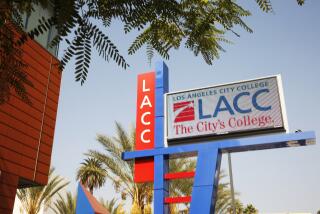LEIMERT PARK : Scholarships From Liquor Firms Debated
- Share via
Representatives of a malt liquor manufacturer and a retail liquor association are funding scholarships for central Los Angeles students, but few in the community are toasting their efforts.
“It’s a buyout,” said Celestine Palmer, a Crenshaw resident and president of the Dorsey Crenshaw Youth Action League, a political action group. “I am glad they’re giving something back to the community that supports them, but I almost resent it. I would rather they give money to advertisements against drinking than this.”
But those in the liquor business maintain that the scholarships are simply a goodwill gesture to the population that best supports them.
Last week at the Regency West club in Leimert Park, Olde English 800 hosted a reception for the California Package Store and Tavern Owners Assn., a group of more than 250 black business owners in Los Angeles and Orange counties.
For four years, the group has awarded scholarships to students at many public and private high schools, including Jefferson, Fremont, Crenshaw, Dorsey, St. Bernard’s, Venice, Inglewood and Lynwood. Thanks to contributions from Olde English totaling more than $18,000 and other funds from grocery, beverage and tobacco industries, 42 students received between $1,000 and $1,250 each for college and trade school expenses. Four of the recipients are Crenshaw and Dorsey seniors.
The scholarships were distributed in the Los Angeles area on the basis of Olde English’s regional sales volume, said Bernard Tarver, the company’s West Coast brand manager. He said that his parent company, Milwaukee-based Pabst Brewing Co., has received virtually no negative feedback from the community that often receives the lion’s share of the association’s scholarships, South-Central.
“I’m trying to send out the message to other corporations that if they’re profiting from a certain community, they have a moral obligation to give back to it,” Tarver said. “I’ve always been committed to returning dollars to the community.
“And as far as selling alcohol goes, the important thing is that the sales are moderated and regulated properly.”
Tarver also pointed out that the association’s scholarships usually don’t go to A students, but to academically average students who are making efforts to improve themselves and their community.
“We’re encouraging students who otherwise wouldn’t get encouragement,” he said.
Jim Colquitt, president of the organization’s scholarship committee, said that the program ensures that liquor companies don’t “just pick the fruit and run.”
“We practically insist that they give back. They’re making money. They have to do something,” Colquitt said.
But to Crenshaw High Principal Yvonne Noble, the benefit of such encouragement pales in comparison to the societal harm done by the consumption of malt liquor. by black youths.
When the announcement of the scholarships came across her desk, Noble said she quietly put it aside rather than inform the school’s college adviser. “It’s definitely a double-edged sword,” she said. “Too many kids drink, and too many are thrown out of school for that reason. It is difficult to ignore the money. . . . I admit it puts me at odds with myself. It’s a great marketing technique.”
Cassandra Clark, a Southwest Los Angeles parent who has supported community efforts to limit alcohol sales and the number of liquor stores in South-Central, was less ambivalent: “Malt liquor is not a recreational beverage, it’s a drug. The liquor industry should be putting that money into alcohol-abuse programs rather than giving it to kids. It’s sending the message, ‘Take our money, buy our product.’ Not all money is good money.”
More to Read
Sign up for Essential California
The most important California stories and recommendations in your inbox every morning.
You may occasionally receive promotional content from the Los Angeles Times.













